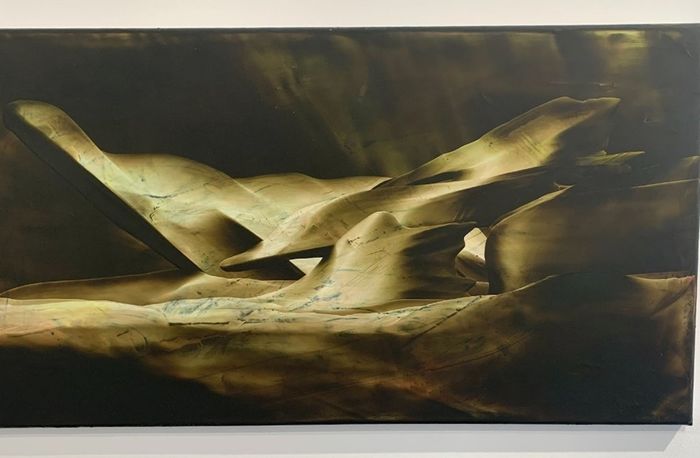‘Knick-knacks’: Crochet boob
In the latest instalment of her column, Eve Connor discusses belief, being human, and the naked truth behind art, all through a hand-crocheted boob

In Hans Fallada’s Little Man, What Now? (1932), Johannes Pinneberg calls on his colleague while his wife is in labour and winds up at a nudist swimming bath. Visitors to St Catharine’s College during Pink Week might have sympathised with the baffled Pinneberg as, approaching the front gate, they encountered a flock of colourful crochet breasts turning gently in the breeze.
The display preceded an auction in collaboration with Catz Yarn Society to raise money for breast cancer charities. I copped (wink) a sparkly pink number with a dappled areola by Romy Copley. Years of watching Antiques Road Trip and Flog It! had prepared me for the online sale. Boob 15, picture 28. A few clicks and she was mine.
“Naked art uncloaks its audience and cries: “You must change your life””
“One has to remember that, in itself,” Pinneberg’s colleague tells him, “nudity is the only civilised thing.” I’ve been wondering about art and nakedness, why I transiently admire the fleshiness of the Italian Room at the Fitzwilliam Museum, yet the fragmentary Apollo Sauroktonos stops me in my tracks. Maybe nudity is a manner, like the gut-punch economy of Raymond Carver or the parallel tenderness and candour of Mary Gaitskill. Egon Schiele is bare even when dressed. Nina Simone’s “Mississippi Goddam” won’t let you drop your gaze, experienced rather than heard. The last line of Rilke’s “Archaic Torso of Apollo” (translated by Stephen Mitchell) startles as though the poet had suddenly untied his coat or fired a gun: “You must change your life.” Yes, that is right. Naked art uncloaks its audience and cries: “You must change your life.”
I half-remember reading an article positing that moral fiction keeps its foot off the pedal and its finger off the key, or some similar analogy. I like this idea enough to feel frustrated that I can’t locate the original piece. To me, moral art keeps its clothes off.
This does not mean art should be “objective” or politically-spayed (an impossibility), nor any of the excuses tried on to justify failures of imagination. Morality isn’t a system of social regulation or a bludgeon to shut people out with, as it has been too often used in the past, but an interest in opening up and refusing the easy line. Of course, I cultivate my own ideologies. I can almost come around to dogma (I take the maybe unevolved view that if you commit to something, you ought to go the whole hog; I am dogmatic, for example, about the dignity of people and against the death penalty. I also think changing your mind is one of the most important things you can do.) Still something insists the artistic project should never sacrifice sight – if not clear, then sincere – for either.
“To me, moral art keeps its clothes off”
How far can we rescue a term like morality, and is it worth it? Christopher Isherwood’s Mr Norris Changes Trains (1935) and Goodbye to Berlin (1939) used to appeal to me precisely because their treatment of the Weimar Republic sidesteps absolutes. People cheat, drink, get abortions, fight, lie, snarl cruel and irresponsible jibes, and the narrator, the famous “camera with its shutter open, quite passive”, records it all. Isherwood denounced both novels later in life. He thought Mr Norris was heartless. Now I feel it is a deeply moral work. The characters, most of whom are based on real people, dance, love, trip over chairs, disassemble and reassemble a gramophone, and try to live, not just survive, in the face of violence.
Where Isherwood’s writing judges, it does so through a process of self-interrogation. Even his memoir, Christopher and His Kind (1976), hardly aloof in its summary of Brian Howard as “one of the most fascinating and dangerous babies of his generation”, constantly reassesses Isherwood’s relationship to his material and undercuts our expectations just as we hope to grasp the narrative. Perhaps only this reflexivity could unite an author, a policeman, an exile, a future Poet Laureate, and “the wickedest man in Europe” in one birthday photograph.
Composing my own photographs of the crochet boob was a great lark. It’s probably time to apologise to everybody I subjected to these photos and whom I am re-subjecting to them here. For the past couple of weeks, I have been bustling around so much I forgot how gargantuan the world is. Then I glimpsed the soft, round, flushed thing on the windowsill and remembered Rilke: “You must change your life.”
I don’t know if he is right. I can’t promise I will agree with this article by the time it is published. Maybe that is OK. It is, whatever else, moral.
 News / Cambridge postgrad re-elected as City councillor4 May 2024
News / Cambridge postgrad re-elected as City councillor4 May 2024 News / Gender attainment gap to be excluded from Cambridge access report3 May 2024
News / Gender attainment gap to be excluded from Cambridge access report3 May 2024 News / Some supervisors’ effective pay rate £3 below living wage, new report finds5 May 2024
News / Some supervisors’ effective pay rate £3 below living wage, new report finds5 May 2024 Comment / Accepting black people into Cambridge is not an act of discrimination3 May 2024
Comment / Accepting black people into Cambridge is not an act of discrimination3 May 2024 News / Academics call for Cambridge to drop investigation into ‘race realist’ fellow2 May 2024
News / Academics call for Cambridge to drop investigation into ‘race realist’ fellow2 May 2024




